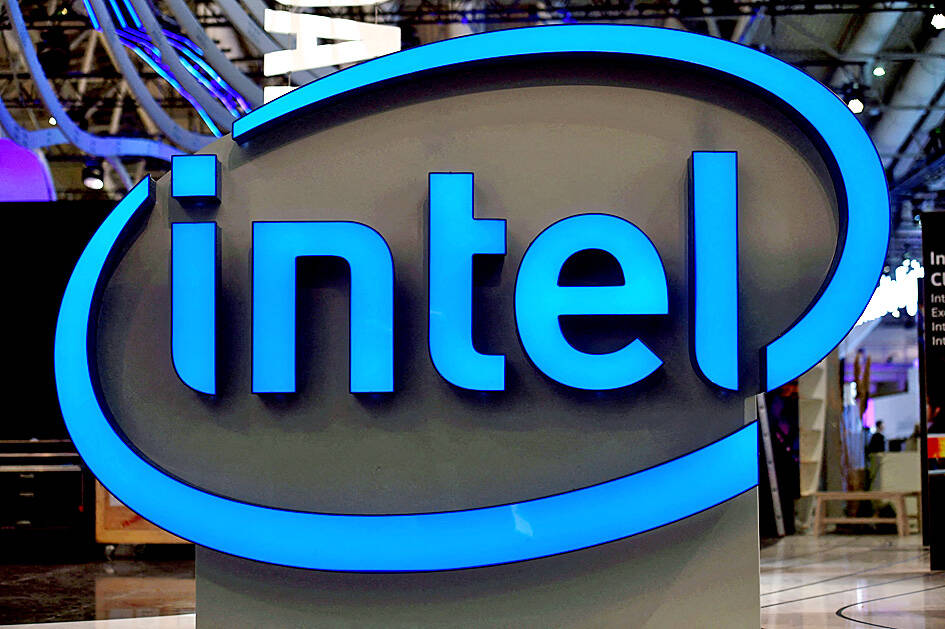Intel Corp has agreed in principle to build a new manufacturing plant in Israel, part of a push by the US semiconductor giant and its chip peers to diversify their production sources.
The preliminary deal was announced by the Israeli Ministry of Finance and Israeli Prime Minister Benjamin Netanyahu on Sunday.
Intel confirmed the company’s “intention to expand manufacturing capacity in Israel,” where it is already active, but did not specify the terms or provide other details.

Photo: Reuters
The facility would be for wafer fabrication, a segment in which Israel is already one of Intel’s four major providers, said a person familiar with the plans who was not authorized to speak publicly.
The expansion would further an effort by Intel CEO Pat Gelsinger to locate more manufacturing outside of Asia, which dominates chip production.
He is also striving to restore the chip pioneer’s technological leadership after companies such as Nvidia Corp and Taiwan Semiconductor Manufacturing Co (TSMC, 台積電) eclipsed its capabilities.
While Netanyahu put the value of the deal at US$25 billion, which he said was the largest foreign investment in Israel and an “expression of confidence” in the nation’s economy, the person familiar with the matter said the total included a previous, US$10 billion investment announced in 2021.
Israeli officials said the project would add thousands of jobs to the almost 12,000 workers already employed by Intel in the country.
The new plant — to join an existing one in Kiryat Gat, south of Tel Aviv — is slated to begin operations by 2027 and remain active until at least 2035, the ministry said.
As part of the deal, Intel woul pay a 7.5 percent tax rate in Israel instead of the 5 percent it is paying.
Sunday’s announcement caps a busy period for the chip industry. Intel on Friday announced a US$4.6 billion facility in Wroclaw, Poland.
Another US chipmaker, Micron Technology Inc, is close to an agreement to commit at least US$1 billion toward setting up a semiconductor packaging factory in India, people familiar with the matter said.
The development plans highlight the global race to diversify supplies of critical components amid US tensions with China.
Companies are also taking advantage of subsidies from foreign governments eager to make sure the supply of chips in their own territories is safe and attracts jobs.
As part of the agreement with Israel, Intel is likely to be eligible for a significant government grant representing 12.8 percent of its total investment.
Intel and Germany have also sealed an agreement for the company to receive subsidies worth 10 billion euros (US$10.9 billion) for a semiconductor manufacturing facility in the eastern part of the country, people familiar with the deal said.
The company is also continuing to expand in Leixlip, Ireland, spending an additional 12 billion euros. It plans to double the manufacturing space there to bring so-called Intel 4 process technology to Europe and offer more foundry services — contract production for other companies.
Once complete, the expansion would bring Intel’s total investment in Ireland to more than 30 billion euros.
In Israel, Intel also has been working to complete the acquisition of the country’s Tower Semiconductor Ltd, a deal announced more than a year ago.
Intel is counting on that US$5.4 billion transaction to help bolster its position in the chip foundry industry, which TSMC dominates.

Intel Corp chief executive officer Lip-Bu Tan (陳立武) is expected to meet with Taiwanese suppliers next month in conjunction with the opening of the Computex Taipei trade show, supply chain sources said on Monday. The visit, the first for Tan to Taiwan since assuming his new post last month, would be aimed at enhancing Intel’s ties with suppliers in Taiwan as he attempts to help turn around the struggling US chipmaker, the sources said. Tan is to hold a banquet to celebrate Intel’s 40-year presence in Taiwan before Computex opens on May 20 and invite dozens of Taiwanese suppliers to exchange views

Application-specific integrated circuit designer Faraday Technology Corp (智原) yesterday said that although revenue this quarter would decline 30 percent from last quarter, it retained its full-year forecast of revenue growth of 100 percent. The company attributed the quarterly drop to a slowdown in customers’ production of chips using Faraday’s advanced packaging technology. The company is still confident about its revenue growth this year, given its strong “design-win” — or the projects it won to help customers design their chips, Faraday president Steve Wang (王國雍) told an online earnings conference. “The design-win this year is better than we expected. We believe we will win

Chizuko Kimura has become the first female sushi chef in the world to win a Michelin star, fulfilling a promise she made to her dying husband to continue his legacy. The 54-year-old Japanese chef regained the Michelin star her late husband, Shunei Kimura, won three years ago for their Sushi Shunei restaurant in Paris. For Shunei Kimura, the star was a dream come true. However, the joy was short-lived. He died from cancer just three months later in June 2022. He was 65. The following year, the restaurant in the heart of Montmartre lost its star rating. Chizuko Kimura insisted that the new star is still down

While China’s leaders use their economic and political might to fight US President Donald Trump’s trade war “to the end,” its army of social media soldiers are embarking on a more humorous campaign online. Trump’s tariff blitz has seen Washington and Beijing impose eye-watering duties on imports from the other, fanning a standoff between the economic superpowers that has sparked global recession fears and sent markets into a tailspin. Trump says his policy is a response to years of being “ripped off” by other countries and aims to bring manufacturing to the US, forcing companies to employ US workers. However, China’s online warriors